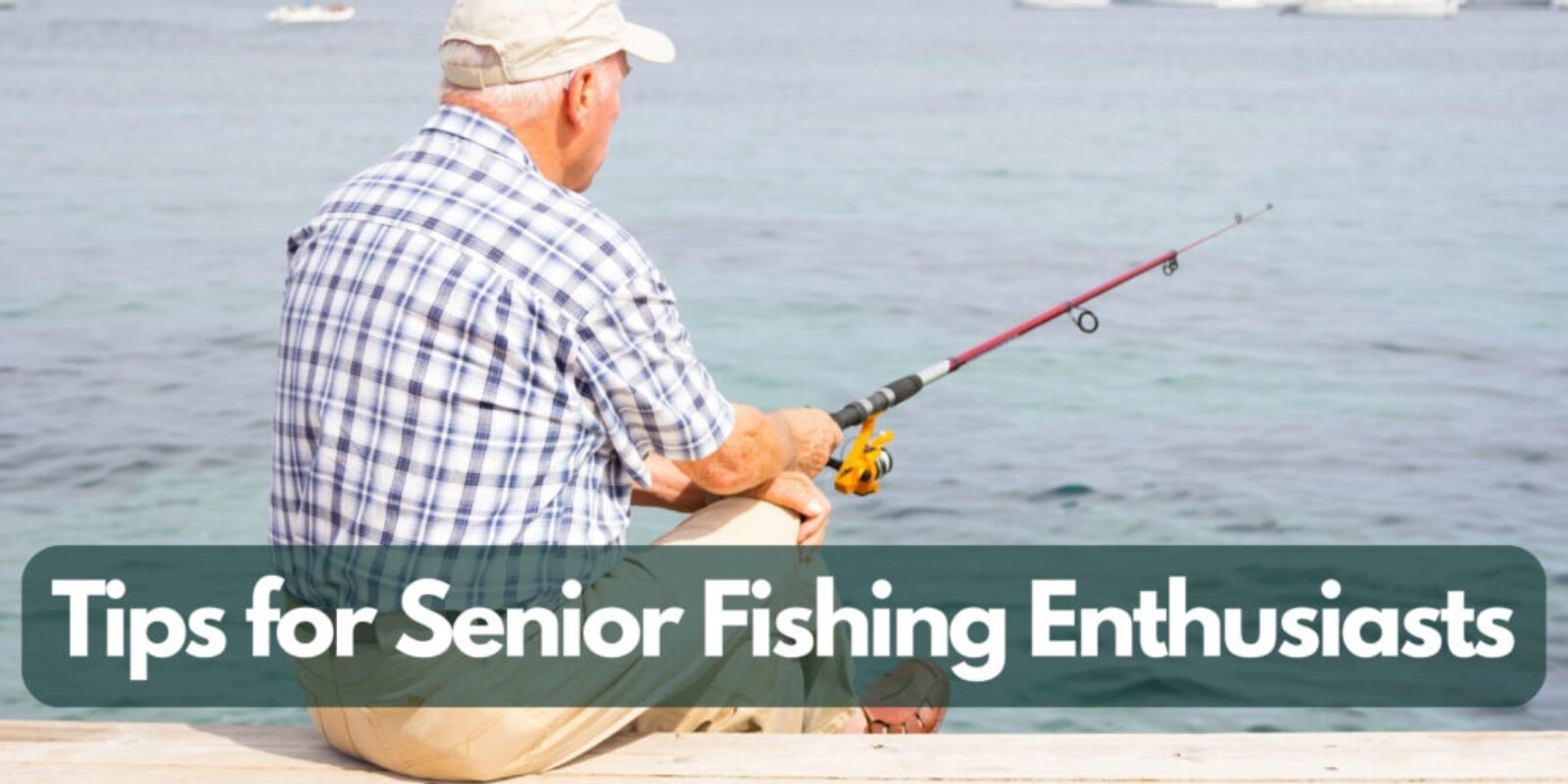Last Updated on July 3, 2025 by Rose Ann Palac
Have you been dreaming of peaceful mornings by the water once retirement arrives? Fishing offers one of the most rewarding ways to embrace this new chapter of life. Whether you’re rekindling a passion from younger days or casting a line for the very first time, fishing provides a perfect blend of relaxation, challenge, and connection with nature that resonates deeply with seniors.
Recent studies show that outdoor activities like fishing contribute significantly to overall well-being in retirement, with 38% of fishing enthusiasts reporting reduced stress levels and improved mental clarity. Beyond the tranquility, fishing offers surprising physical benefits—from improved balance and coordination to gentle, low-impact exercise that keeps you moving without straining joints.
This comprehensive guide explores why fishing becomes such a meaningful pursuit in retirement. We’ll cover everything from the mental health advantages and social opportunities to practical advice on selecting senior-friendly equipment. You’ll discover how fishing communities welcome newcomers of all experience levels, and how this timeless activity can open doors to new adventures, friendships, and a profound sense of accomplishment.
Whether you’re looking to fish in local ponds, join competitive tournaments, or use fishing as a gateway to travel adventures, this guide provides the essential information to help you cast off into this rewarding chapter of life. Ready to discover how fishing can transform your retirement experience?
Why Take Fishing in Retirement?
Few preoccupations in one’s later life can capture the imagination, enrich your experience, and soothe the tired mind quite like fishing in retirement. If you are new to the sport, you might wonder why fishing holds such an allure for countless millions of retirees around the globe.
Fishing in retirement – just like all fishing – isn’t just about catching fishing. Often seen as a symbol of tranquility and freedom, fishing is a slow, sweet dance with nature and a gateway to your calmer, more reflective self.
It is about the excitement you feel as you prepare your gear days in advance of your fishing trip. It is about waking up at daybreak, emerging from the tent, rising into the grey half-light, and breathing in the cool, crisp air.
Fishing can, of course, also be characterized as a life-long activity – a tradition. Participation in childhood and adolescence predicts participation as an older person.
If you are a senior who wants to learn how to fish, do not let your lack of experience discourage you. You should know that fishing offers a captivating connection with nature. It permits you to escape the chaos and rush of modern living.
Prefer to listen rather than read?
You might learn how to fish in a pond if that is what you prefer. You might learn to fish in a mighty flowing river, or you might choose to throw your line out into the open sea, even.
Whatever form of fishing you choose to learn, you should know that fishing in retirement offers a profound and healthy experience of relaxation, continuous learning, and exhilaration both for beginners and experts alike.
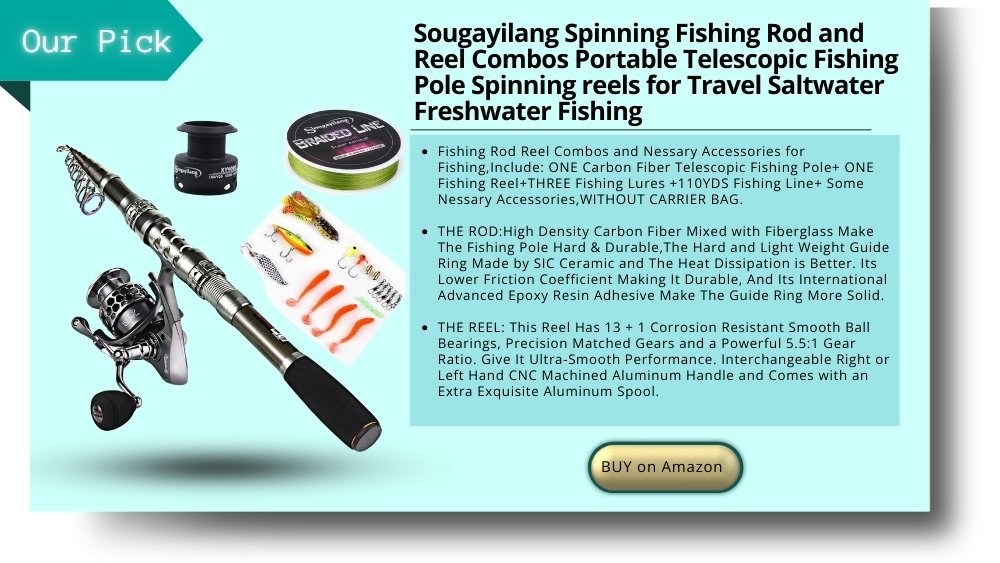
Fishing is a Healthy Activity for Seniors
Whether you are a beginner or a retiree who wants to try an old passion again, fishing in retirement offers many benefits. Fishing is not only a fun hobby for all generations in the family, but it is good for your overall well-being, too.
The soothing sounds of water and the peaceful surroundings create an environment conducive to mindfulness, allowing retirees to alleviate anxiety.
Fishing for Good Health and Peace of Mind
Planning how to spend your free time in retirement is an important step toward ensuring your emotional well-being as you age. This is particularly true for men, who are more likely to experience depression and anxiety when retiring.
Going out to fish regularly can help you relax and enjoy yourself. In fact, an impressive 38 percent of fishing enthusiasts find fly-fishing an excellent way to relieve stress. Mental health experts say this is mostly thanks to the calming motion of casting the rod back and forth, as well as the peacefulness of the natural surroundings.
In this way, fishing in retirement can add valuable structure to your daily life while also helping to keep your mental health in check.
Aside from the mental health benefits that come with regular participation in a quiet, outdoor activity, the physical health benefits of fishing are invaluable. Eighty one percent of American retirees say that good health permits them to relish their golden years.
This makes fishing in retirement particularly important, when health and fitness need to be a priority.
Fishing is a Gentle Exercise
The physical aspects of fishing—casting lines, reeling in catches, and navigating the waters—provides a gentle form of exercise. This low-impact activity can enhance mobility, improve balance, and help maintain joint flexibility, crucial factors in promoting overall physical health for seniors.
While it may not look like hard work, fishing in retirement can be a little more physically demanding than you might realize. For example, fishing activities such as wading will work your core and legs, as well as your heart. This builds your overall strength and stamina over time.
The same is true with fishing while standing. It looks deceptively easy, of course. But that, too, works your core muscles and balance. This is particularly important as a third of Americans over 65 suffer from falls every year.
This type of fishing is therefore a good option if you are less stable on your feet and want to try fishing in retirement.
Beyond the physical aspects, fishing in retirement contributes significantly to mental health. The serene ambience and slower pace of the activity offer seniors an opportunity to disconnect from the demands of daily life and technology.
This break from the hustle nad bustle is good for mental clarity and reduces mental fatigue. In turn, the anticipation and excitement of catching fish can boost mood and self-esteem. The sense of accomplishment derived from mastering new techniques or reeling in a prized catch can instil a sense of fulfilment, positively impacting mental well-being in retirement.
Overall, fishing in retirement is an activity that not only promotes physical fitness but also nurtures mental tranquillity and contentment in the retired community.

Fishing in Retirement Allows Seniors Fun Opportunities to Socialize
Seniors living at home do not have as many opportunities to socialize with friends and family as when they were younger. Fishing in retirement allows seniors to join outings, often serving as a platform for intergenerational bonding.
Seniors frequently pass down their fishing knowledge and skills to younger family members, creating cherished moments and lasting connections between generations.
Fosters Friendships
Fishing in retirement also permits seniors outdoor excursions. These outings often involve group activities, like tournaments or group trips, where retirees engage in friendly competition or collaborative efforts. These shared experiences not only create lasting memories but also contribute to a sense of purpose and social fulfilment during retirement.
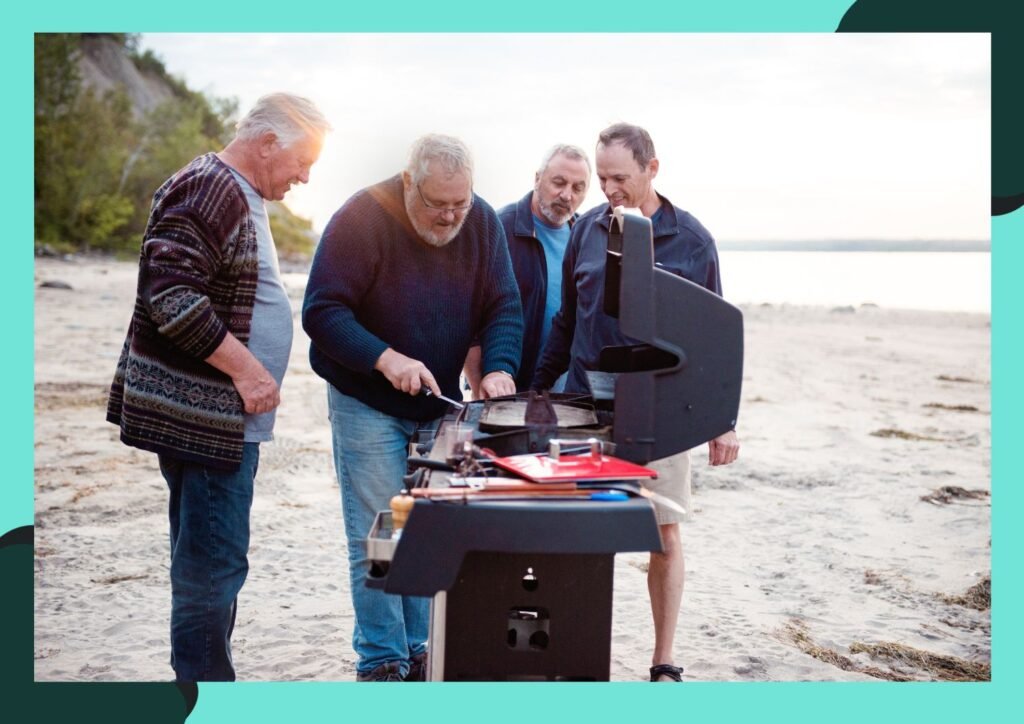
Fishing in Retirement Offers Wonderful Travel Opportunities
The shared experience of catching fish with friends in retirement presents seniors with a wonderful opportunity to explore the world and experience new places and cultures. The pursuit of angling often takes retirees to various fishing spots—be it serene lakes, meandering rivers, or coastal shores, inspiring you to explore different landscapes and ecosystems.
Travelling to these destinations not only satisfies the innate desire for adventure but also provides you with opportunities to appreciate the vastness of nature’s beauty better. Whether freshwater in picturesque mountain streams or saltwater along the coastline, each location presents a unique experience.
It’s an Adventure
That’s because exploring new fishing grounds offers a thrilling, enriching lifelong adventure. It continues well beyond the act of casting lines.
From the majestic fjords of Norway to the expansive waters of the Amazon, or the coral reefs of Australia to the tranquil lakes nestled in the Canadian Rockies, the diversity of fishing locales quietly invites, coaxes, and finally beckons.
The pursuit of different fishing opportunities in new places not only offers a change of scenery but also opens doors to new experiences, cultures, and interactions with local communities.
Enjoy a Wide Range of Complementary Outdoor Activities
Seniors going on fishing trips often find themselves in a natural world with a chance to try outdoor activities other than their angling pursuits. Many destinations offer breathtaking natural landscapes, inviting seniors who go fishing in retirement to indulge in other outdoor activities. These include picnicking, hiking along scenic trails, and birdwatching in marshlands.
It’s Always a Well-rounded Activity!
In other fishing areas, you can try kayaking or canoeing along rivers or paddleboarding across lakes. For the more adventurous, activities like snorkelling or scuba diving in coastal regions with vibrant marine life offer a chance to explore the ocean.
All these activities not only increase the joy of fishing in retirement but also provide a well-rounded outdoor experience that provides a richer, deeper connection with nature and a sense of fulfilment beyond their former professional careers.
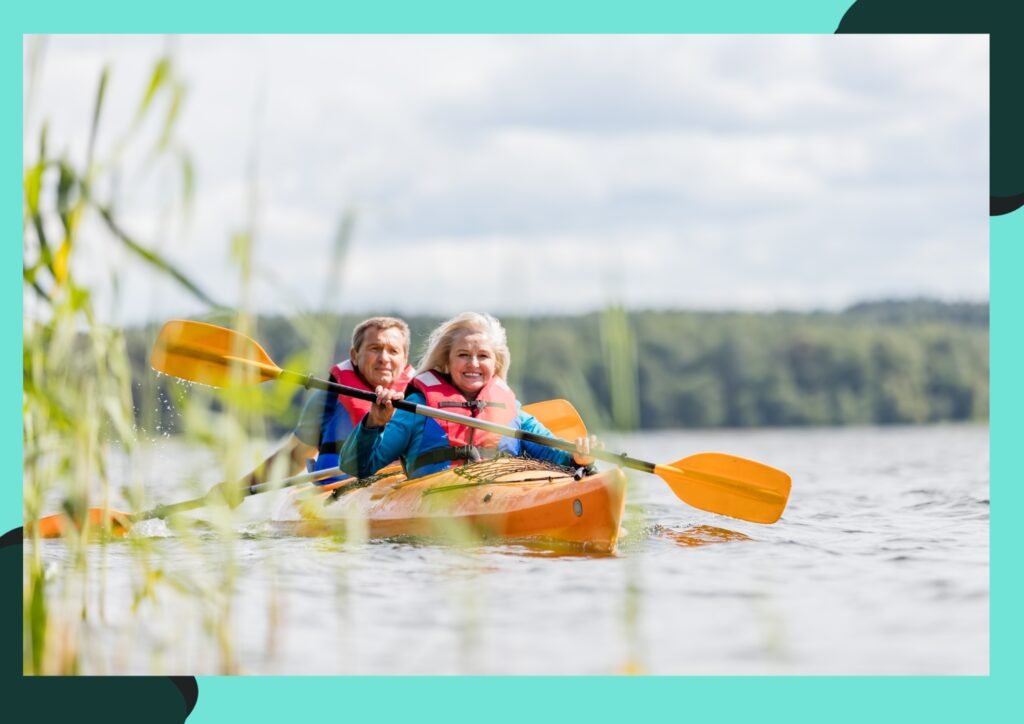
There are Many Ways for Older Beginners to Learn About Fishing
If you are a beginner taking up fishing in retirement, don’t worry. You have many ways to learn about it. Below are just some.
- Local Classes or Workshops
- Check with local community centres, fishing clubs, or outdoor stores that might offer classes specifically designed for seniors.
- Online Resources
- Explore online tutorials, videos, or guides tailored for beginners.
- Websites, forums, and YouTube channels often provide step-by-step instructions.
- Fishing Charters or Guides
- Consider booking a guided fishing trip.
- Many guides specialize in teaching newcomers and can offer hands-on instruction.
- Fishing Events
- Attend fishing events or seminars organized for beginners.
- These events often have experienced anglers available to offer advice and demonstrations.
- Join a Fishing Club
- Joining a local fishing club or association can provide access to experienced anglers who are usually happy to share their knowledge and tips.
Don’t hesitate to ask for help from experienced anglers or locals while out fishing. Most people in the fishing community are friendly and willing to help newcomers. For both beginners and experts, fishing in retirement takes time and practice. Be patient and persistent. Remember, it’s not just about catching fish but also enjoying the experience and learning new things.
Whether you are a beginner or an expert, every trip offers learning opportunities. Pay attention to what works and what doesn’t, and gradually improve based on your new experiences.
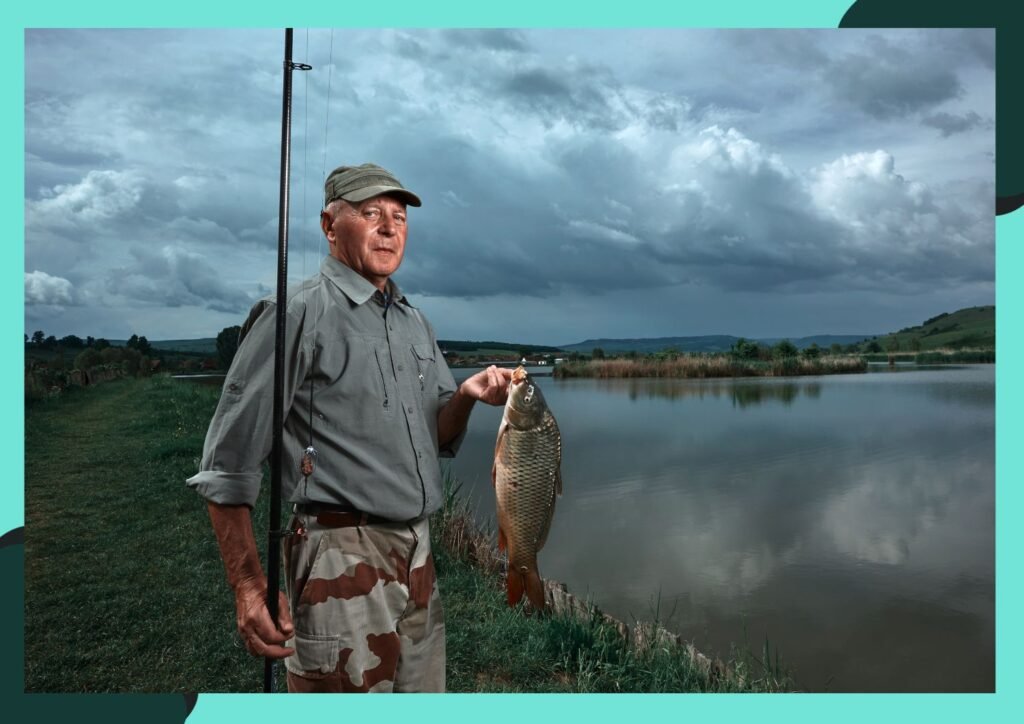
Equipment and Gear You Will Need for Fishing in Retirement
Beginners and experienced anglers who take up fishing in retirement must invest in gear and permits. Do remember that fishing in retirement does not have to be an expensive activity.
The lavish fun and leisure of visiting other countries to fish aside, angling in local ponds, lakes, or nearby streams, can be inexpensive compared to travelling to remote areas or deep-sea fishing, which may involve chartering a boat. Start small and see where it goes from there.
Here is a basic checklist of the equipment you’ll need:
- Fishing Rod
- Choose a lightweight and comfortable rod.
- Look for one with an ergonomic grip to reduce strain on the hands.
- Reel
- Choose a reel that’s easy to operate with a smooth drag system.
- Consider one with larger handles for easier gripping.
- Fishing Line
- Select a monofilament or fluorocarbon line of appropriate weight for the target fish.
- Thicker lines are generally easier to handle.
- Set of Hooks
- Have a variety of sizes and types of hooks to suit different bait and fish sizes.
- Larger hooks can be easier to handle for seniors.
- Bobbers/Floats
- These help to detect bites. Larger, brightly coloured bobbers are easier to see, making them more suitable for seniors.
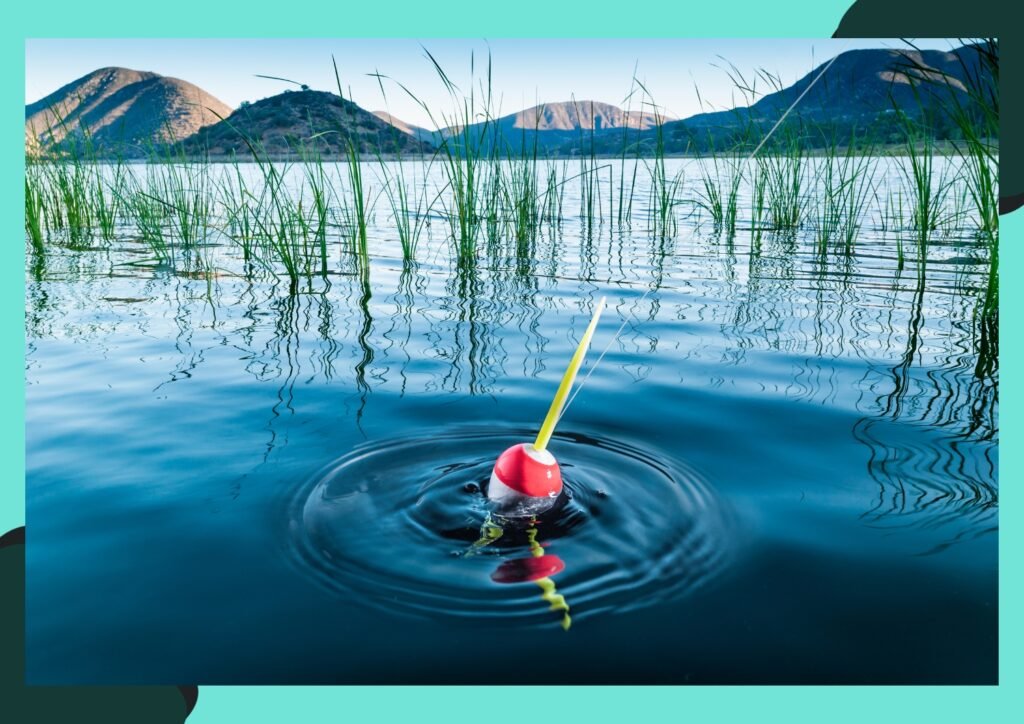
- Weights/Sinkers
- Different sizes for varying water conditions and depths.
- Clip-on weights can be easier to handle than traditional ones.
- Fishing Tackle Box
- Keep all your smaller items organized, including extra hooks, sinkers, swivels, and other accessories.
- Fishing Hat
- Choose a wide-brimmed hat that provides shade and protection from the sun.
- Look for one with a chin strap to prevent it from blowing away.
- Sunscreen
- Protect the skin from harmful UV rays, especially if fishing for extended periods in sunny conditions.
- Polarized Sunglasses
- Helps reduce glare from the water, making it easier to see into the water and reducing eye strain.
- Fishing Vest or Tackle Bag
- An easy-to-carry option to keep essentials like pliers, line clippers, and other tools close at hand.
- Fishing Chair or Stool
- Consider a lightweight, portable chair with back support for comfort during long fishing sessions.
- Landing Net
- Easier to land and handle fish, especially larger ones. Look for one with a long handle for better reach.
- First Aid Kit
- Essential for any outdoor activity, it should include bandages, antiseptic wipes, pain relievers, and any necessary medications.
- If any of these items are not included, get them separately.
- Gloves
- Choose gloves that can protect your hands from sunburn and blisters while still allowing dexterity.

The Low-Down on Fishing in Retirement
Maybe there is a bit of voyeur in all of us. Or perhaps it is ancestral memory harking back to our primal roots as nomadic hunter-gatherers.
You rise early to beat the morning sun. You head out along the path before anyone is awake, make a turn into the forest, and head for the stream. It is early in the morning. Dawn is just about to break and you see the color of the sky changing. Nobody sees you moving underneath the trees.
By the stream, finally, you watch the surface of the water, noticing how it moves. You are looking for deep, slow-moving water. That is where the trout are likely to feed. You choose a fly of a similar size, colour, and appearance as those bugs you see in the water.
You flick the line back and forth over your head and lay the nearly weightless bait down with as little a splash as possible where the fish are feeding. You note the direction of the wind. You estimate the length of the line against the depth of the water – and you wait.
Fishing in retirement allows you time to solve the little puzzles of the natural world. And your success has an unmistakable measure: the surface breaks and you feel that tug of a fish taking the line.

Like No Other Thrill
For whatever reason, anyone who enjoys fishing will tell you that there is something about seeing a fish take the bait on the surface of the water that exceeds any other thrill offered by any other sport.
Fishing in retirement signals a new beginning to a struggle as old as humanity itself: The age-old duel between man and fish.
There where the stream bends, watching the water move, you are greeted by a trout nipping at a dry fly. Or perhaps a pike zooming from cover for your deer hair mouse, or a largemouth smashing the mirror of a quiet pond as it swallows a minnow.
These are just some of the little joys that fishing in retirement might bring you. There are many more, of course.
Beyond catching fish, fishing in retirement permits seniors a new way to restore their connection to nature’s s intricate moods and progressions. Casting a line is not just about throwing a line over the water, it is a uniquely mindful act – a natural act.
It reminds us of lessons we learned early on in life but may have forgotten in our later years. Much like life, it is about persistence, patience, and the endeavour to gain fulfilment. Fishing in retirement allows retirees to engage fully in their surroundings. In these moments, anglers become a part of an ancient and meaningful – but, these days, too often ignored – kinship between people and nature.
What do you think?
Frequently Asked Questions About Fishing in Retirement
- I’ve never fished before. Is retirement too late to start learning?
- Absolutely not! Retirement is actually an ideal time to begin fishing. You now have the time to learn at your own pace, and many fishing communities are especially welcoming to mature beginners. Start with simple equipment and perhaps take a guided trip where an expert can show you the basics. Remember, fishing is about enjoying the experience as much as catching fish.
- How physically demanding is fishing for seniors?
- Fishing can be adapted to almost any physical ability level. From relaxing bank fishing that requires minimal movement to more active wade fishing, there’s an option for everyone. Many modern fishing gears are designed with lightweight materials and ergonomic grips specifically with comfort in mind. Start with shorter sessions and gradually build stamina as you become more comfortable.
- What are the best fishing locations for retirees who are beginners?
- Start with calm, accessible waters like community ponds, lakes with fishing piers, or guided charter trips where professionals handle the complex aspects. Look for locations with facilities like benches, shade, and restrooms nearby. Many state parks and recreation areas maintain fishing spots specifically designed for accessibility.
- Do I need an expensive setup to start fishing in retirement?
- No, you can begin with a basic, quality combo that won’t break the bank. Many sporting goods stores offer starter kits designed for beginners that include all essentials. As your skills and interests develop, you can gradually invest in specialized equipment if you wish. Remember that comfort and ease of use are often more important than premium features.
- Are there fishing communities specifically for seniors?
- Yes! Many areas have fishing clubs or groups specifically for mature anglers. These groups often organize regular outings, share transportation, and provide a wonderful social dimension to fishing. Additionally, many tackle shops host senior fishing events or can connect you with local groups. The camaraderie of these communities often becomes as valuable as the fishing itself.
- How can fishing benefit my health in retirement
- Recent studies show fishing offers numerous health benefits for seniors. The gentle, sustained movements improve flexibility and coordination, while the focus required provides cognitive stimulation. The outdoor exposure increases vitamin D production, and the peaceful environment reduces stress hormones. A 2023 study found that seniors who fish regularly experienced a 27% reduction in reported stress levels compared to those who didn’t engage in similar outdoor activities.
- What safety precautions should seniors take when fishing?
- Always fish with a companion or let someone know your location and expected return time. Wear appropriate sun protection including hat, sunglasses, and sunscreen. Stay hydrated and bring necessary medications. Consider wearing a personal flotation device near deep water, even when shore fishing. Modern, lightweight inflatable PFDs are comfortable options that don’t restrict movement while providing crucial safety.
- Can fishing help with the transition to retirement?
- Many retirees find fishing provides perfect structure during the adjustment to retirement. The combination of planning, skill development, and the natural rhythm of fishing trips helps establish new routines. The fishing community also offers social connections to replace workplace relationships, while the pursuit itself provides purpose and goals independent of former career achievements.
REFERENCES
REFERENCES
- American Sportfishing Association. (2023). Special Report on Fishing.
- Journal of Physical Activity & Health. (2023). Psychological Benefits of Outdoor Physical Activity in Natural Versus Urban Environments: A Systematic Review and Meta-Analysis of Experimental Studies.
- National Institute on Aging. (2024). Participating in Activities You Enjoy As You Age.
- National Environmental Education Foundation. (2023). Enjoy the Health Benefits of the Outdoors at Any Age.
- Centers for Disease Control and Prevention. (2024). Facts About Falls.
- National Council on Aging. (2024). Get the Facts on Falls Prevention.
Disclaimer
The content provided on MySeniors.World is for informational purposes only and is not intended as either financial or medical advice. Always consult a qualified professional before making any investment or health-related decisions.
Posts may contain affiliate links, meaning we earn a commission – at no additional cost to you, if you click through and make a purchase. Your support helps us continue providing valuable content.
